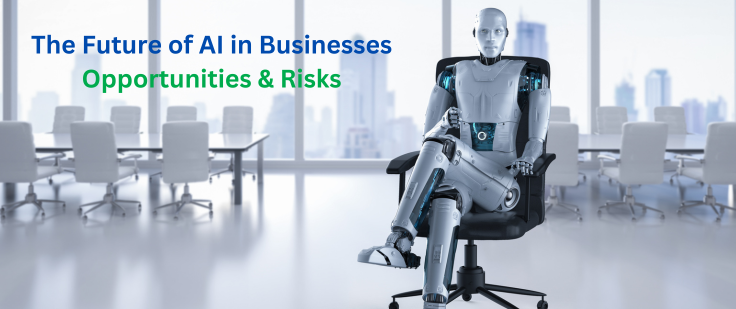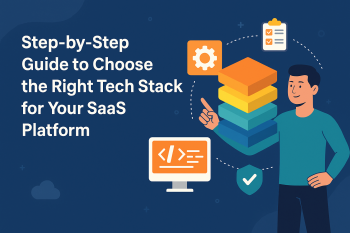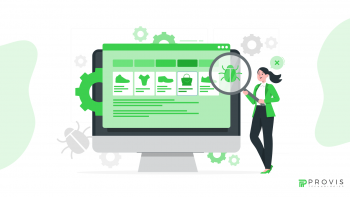Artificial Intelligence (AI) is rapidly transforming the business space. From automating routine tasks to optimizing complex decision-making processes, AI is speeding up & bettering the ways businesses process & operate. As we look ahead, it’s essential to understand both the opportunities and risks that come with AI.
Possible Opportunities to Look Forward
-
Automation of Repetitive Tasks
One of the most significant opportunities AI offers businesses is repetitive task automation. This includes data entry, customer support, and manufacturing processes. By taking over these day-to-day responsibilities, AI enables the human workforce to focus on more creative, strategic, and value-added tasks.
-
Enhanced Decision Making
The speed of AI is indeed unmatched. As a result, businesses can make more informed decisions by leveraging AI to analyze data and generate insights. From predicting customer behavior to optimizing supply chain operations, AI has the potential to transform decision-making processes.
-
Improved Customer Experiences
AI-powered chatbots and virtual assistants are becoming more sophisticated – offering personalized and round-the-clock customer support. This enhances customer experiences and reduces the cost of maintaining large customer service teams.
-
Cost Savings
AI can lead to reduced costs for companies by automation. Whether in supply chain management or customer service – AI-driven processes can cut operational expenses.
-
Personalization
AI algorithms can analyze customer data and behavior to create highly personalized experiences. This is particularly valuable in marketing & e-commerce, where customization and content can lead to higher sales and customer satisfaction.
-
Predictive Maintenance
In sectors like manufacturing and aviation, AI can predict when equipment or machinery is likely to fail. This allows companies to perform maintenance before a breakdown occurs – it can minimize downtime and reduce harsher maintenance costs.
-
Competitive Advantage
As AI adoption becomes more popular, businesses that embrace AI early gain a competitive advantage. They can deliver better products & services, streamline operations, and respond to market changes more swiftly.
Don’t Miss: How to Improve Your Website With Artificial Intelligence?
Possible Risks to Expect
-
Job Displacement
While AI can automate tasks, it also raises concerns about job displacement. Many traditional jobs may become obsolete as AI and automation take over. For example, customer service representatives, writers, and even some medical professionals could see their roles change or diminish.
-
Data Privacy & Security
Since businesses collect and analyze more data with AI – data privacy & security become major concerns. Mishandling or data breaches can result in significant legal and reputational consequences. Businesses need to implement robust security measures and adhere to data protection regulations.
-
Bias & Fairness
AIs are data-driven – if the data used to train these systems is biased, AI can perpetuate & amplify existing biases. This can lead to discrimination in hiring, lending, and other critical areas. Businesses must actively work to sustain a corruption-free AI environment.
-
Accountability & Transparency
As AI systems become more complex & autonomous, it might be challenging to assign accountability when something goes wrong. Ensuring transparency in AI decision-making processes and establishing clear lines of responsibility is crucial.
-
Technological Dependence
Relying heavily on AI can lead to technological dependence. If AI systems fail or are compromised, businesses may be unable to perform critical functions. Maintaining human expertise alongside AI systems is essential to mitigate this risk.
-
Ethical Concerns
The use of AI in businesses can raise ethical concerns, especially in areas such as facial recognition, surveillance, and autonomous weapons. Companies need to consider the ethical implications of their AI applications and be prepared to address public concerns.
-
Regulation
As AI continues to advance, governments are beginning to implement regulations. Navigating this evolving regulatory landscape can be challenging for businesses, as they must stay compliant and adapt to new rules.
Must Know: How to Create an App Using AI/ML for Your Business
How can Risks be avoided?
To harness the opportunities of AI in businesses while mitigating the associated risks, companies can take several key steps:
-
Invest in Education & Training
Preparing your workforce for the AI-driven future is essential. This includes not only technical training but also educating employees about the ethical implications of AI.
-
Data Ethics & Governance
Implement robust data ethics and governance practices to ensure that the data used to train AI models is fair, unbiased, and secure.
-
Transparency & Accountability
Establish clear lines of responsibility and transparency in AI decision-making processes. It will build trust and help in identifying & rectifying issues when they arise.
-
Regulatory Compliance
Stay up-to-date with AI-related regulations and ensure that your business complies with them.
-
Balanced Use of AI
AI usage should be limited to human assistance. Human expertise should remain a core component of your business strategy to avoid machine conflict.
-
Ethical Considerations
Take a hard look at the ethical implications of your AI applications. Addressing these concerns can prevent public backlash and legal issues.
-
Cybersecurity
Prioritize robust cybersecurity measures to protect the data and AI systems from breaches.
-
Continual Adaptation
Be prepared to adapt and evolve as AI technology advances and the business landscape changes. Static behavior in the face of rapid technological development can be a significant risk.
Also Read: Top 10 Key Benefits of Artificial Intelligence for Business
Conclusion
AI is the future of business. Its ability to streamline operations, enhance decision-making, and improve customer experiences is too valuable to ignore. However, AI users must navigate the challenges and risks associated with it. Success in the AI-driven future requires a balanced approach that uses the power of AI while respecting the principles of ethics, transparency, & human expertise. With the right strategy & mindset, businesses can unlock the full potential of AI to ensure a brighter future for their operations and the world.
Written By
Author's Picks
- Top SaaS Trends in 2024 Game – Changing SaaS Trends
- 11/01/2024
- Importance of Progressive Web Apps (PWAs) in E-commerce
- 15/03/2024
- Laravel + AngularJS A super Combo For Modern Web Development
- 14/01/2019
Categories
- AI for Startups
- AI in Web Development
- AI Integration
- AI Platforms
- AI Prompt
- AI Tools
- AI Trading Software
- Android App
- Android vs iOS Development
- Angular
- API
- API Development
- App
- app development
- App Idea
- App User Feedback
- Application
- Artificial Intelligence
- Audit Services
- Automotive Industry
- Awards and Recognition
- Business Consulting
- Business Website
- Chatbots
- CRM
- CRM for Financial Advisors
- Custom CRM
- Custom SaaS
- Custom Website
- Customer Service
- dashboard design
- Developing a Mobile App
- Digital Business
- E-commerce
- EMR Integration
- Finance
- Financial Advisors
- Financial Advisors
- GIT
- Health Insurance
- iOS App
- iOS App Development
- IoT Mobile App Development
- IoT Platforms
- IT Audit Services
- IT Consulting
- IT Strategies
- Java Development
- Laravel
- Lean Canvas
- Learning Management System
- Logistics Apps
- Mobile App Development
- MVP
- Native App
- News Aggregator Site
- OTT
- Outsourcing IT
- Payment Gateway
- predictive analysis
- Product Launch Strategy
- Progressive Web App (PWA)
- Prototype
- Recommender Systems
- Ruby
- SaaS
- SaaS Application
- SaaS Business
- SaaS Company
- SaaS Development
- SaaS Product
- SaaS Project
- Sales Funnel
- SEO
- Shopping Cart
- Software Development
- SSL and TLS
- Startup Checklist
- Technology
- Tetradic Color Scheme
- UI/UX Design Company
- Unit Testing
- User Flow
- User Testing
- Web Development
- Web Performance Optimization
- website Maintenance Services
- Website Migration Service
- Website Speed Optimization
- WooCommerce
- WordPress





